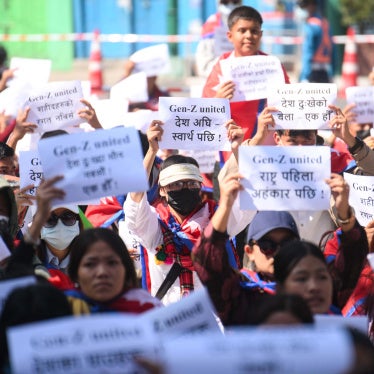(New York) - A landmark ruling today by Sierra Leone's war crimes court removes any legal basis for Nigeria continuing to harbor former Liberian president Charles Taylor.
The Special Court for Sierra Leone ruled that sitting heads of state are not immune from prosecution before an international criminal tribunal or court. Human Rights Watch therefore urged the Nigerian government to turn Charles Taylor over to the Special Court to face trial for his alleged crimes.
In another important decision, the Special Court ruled today that it can prosecute the recruitment or use of children under the age of 15 as soldiers because it was a crime under international law during the entire period covered by the Special Court's authority. The recruitment and use of child soldiers is one of the charges against each of the 11 defendants from all warring factions indicted by the court, including Taylor.
The Special Court for Sierra Leone, which is backed by the United Nations, indicted Charles Taylor on 17 counts of war crimes and crimes against humanity for his role in contributing to the death, rape, abduction, and mutilation of thousands of civilians during Sierra Leone's civil war from 1991 to 2001. After being forced from power in August 2003, the former Liberian president is currently in exile in Nigeria.
"With this decision, Charles Taylor has no more legal cards to play," said Richard Dicker, director of the International Justice program. "The time has come for Nigeria to hand Taylor over to the Special Court."
Human Rights Watch also called on the international community to urge Nigeria to surrender Taylor. The United Nations and United States reportedly played a major role in negotiating the agreement that led to Taylor's leaving Liberia and receiving safe haven in Nigeria.
Taylor's lawyers argued that the former Liberian president enjoys immunity from prosecution for war crimes and crimes against humanity for several reasons. These arguments include that Taylor was a sitting head of state at the time of his indictment and that the Special Court violated an international legal principle that a state cannot assert its authority over another state.
However, the judges ruled that a sitting head of state can be prosecuted by the Special Court. Affirming that the Special Court is an international court, the judges found that it has been established that the principle that a state cannot interfere in the affairs of another state does not bar prosecution of a sitting head of state before an international criminal tribunal or court.
"No one should be above the law when it comes to widespread amputations, murder, and rape," said Dicker. "This important ruling strengthens the principle that those who commit serious crimes must be held accountable, regardless of their position."
On child recruitment, conscripting or enlisting children under the age of 15 or using them to participate actively in hostilities is included in the Special Court's statute as a serious violation of international law that could be prosecuted by the court. However, one of the defendants, Sam Hinga Norman, the leader of Sierra Leone's Civil Defense Militias and then vice-minister of defense, challenged the authority of the Special Court to try these crimes. He argued that international law did not establish individual criminal responsibility for the offense during the period covered by the court's authority.
"The lives of thousands of Sierra Leonean children recruited by all sides during the civil war were torn apart by this appalling practice," said Dicker. "This ruling will make it possible to prosecute the perpetrators."
Background on Charles Taylor and the Special Court
Elected president of Liberia in 1997 after a seven-year war that ousted former president Samuel Doe, Charles Taylor gained notoriety for the brutal abuses against civilians committed by his forces in Liberia, and for his use of child soldiers organized in "Small Boy Units." Forces supported by Taylor have been involved in conflicts in neighboring Guinea and Cote d'Ivoire. There are credible reports that Taylor remains in frequent contact with members of his former government, and that hundreds of fighters loyal to him are undergoing training in Liberia near the border with Cote d'Ivoire. The U.N. peacekeeping force in Liberia has expressed concern about the allegations of training, but so far has found no evidence to support them.
The Special Court has the power to prosecute those "who bear the greatest responsibility" for serious violations of international humanitarian law and certain violations of domestic law committed in Sierra Leone since November 30, 1996. The United Nations created the Special Court through an agreement with the government of Sierra Leone. Nine senior, indicted war criminals are currently in custody awaiting trial in the court's detention facility.
|
News Release
Sierra Leone: Landmark Rulings Advance Justice
Charles Taylor Not Immune from Prosecution, Child Recruitment a Punishable Crime
Your tax deductible gift can help stop human rights violations and save lives around the world.
Region / Country
Most Viewed
-
March 29, 2021
“Everything I Have to Do is Tied to a Man”

-
November 25, 2019
A Dirty Investment

-
February 12, 2026
Nepal: Publish Reports on Violent Crackdowns on Protests

-
November 19, 2012
Losing Humanity

-
July 31, 2023
“The Sea is Eating the Land Below Our Homes”


